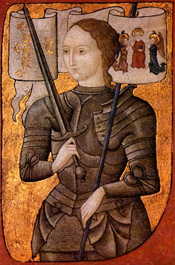
02 Sep 2007
VERDI: Giovanna d’Arco
Giovanna d’Arco, dramma lirico in a prologue and three acts.
Music composed by Giuseppe Verdi. Libretto by Temistocle Solera.
Mozart and Salieri, an opera in one act consisting of two scenes.
Nicolai Rimsky-Korsakov (1844-1908), composer. Libretto derived from Alexander Puskhin's play of the same name.
First performance: 7 December 1898 in Moscow.
Ariadne auf Naxos, Oper with a prologue and one act. Music composed by Richard Strauss. Libretto by Hugo von Hofmannsthal.
La Vestale, a tragédie lyrique in three acts.
Boris Godunov, an opera in four acts with prologue
Modest Mussorgsky, composer. Libretto by the composer, based on Alexander Pushkin's drama Boris Godunov and Nikolai Karamazin's History of the Russian Empire
First performance: 8 February 1874 at the Mariinsky Theatre, St. Petersburg
Il Trovatore, dramma in four parts.
Only a few months following the premiere of Der Rosenkavalier, Hugo von Hofmannsthal proposed a new opera to Richard Strauss based on Molière’s comedy-ballet, Le Bourgeois gentilhomme (in German, Der Bürger als Edelmann).
Die Entführung aus dem Serail, Singspiel in 3 Acts.
Music composed by Wolfgang Amadeus Mozart (1756–1791). Libretto by Johann Gottlieb Stephanie the Younger, based on an earlier libretto by
Christoph Friedrich Bretzner.
Die Entführung aus dem Serail, Singspiel in 3 Acts.
Music composed by Wolfgang Amadeus Mozart (1756–1791). Libretto by Johann Gottlieb Stephanie the Younger, based on an earlier libretto by
Christoph Friedrich Bretzner.
Arabella: Lyrische Komödie in three acts
Die Entführung aus dem Serail, Singspiel in 3 Acts.
Music composed by Wolfgang Amadeus Mozart (1756–1791). Libretto by Johann Gottlieb Stephanie the Younger, based on an earlier libretto by
Christoph Friedrich Bretzner.
La Gioconda, dramma lirico in four acts.
Music composed by Amilcare Ponchielli (1834–1886). Libretto by Arrigo Boito (under the pseudonym Tobia Gorrio), based upon Victor Hugo's Angelo, Tyrant of Padua (1835).
Don Carlo, an opera in four acts. Music composed by Giuseppe Verdi (1813–1901). Libretto by Joseph Méry and Camille Du Locle after Friedrich von Schiller’s dramatic poem Don Carlos, Infant von Spanien. Revised version in four acts (French text revised by Du Locle, Italian translation by Achille de Lauzières and Angelo Zanardini).
Un ballo in maschera, a melodramma in three acts.
Music composed by Giuseppe Verdi. Libretto by Antonio Somma, based upon the work of Eugène Scribe Gustave III ou Le bal masqué (1833)
Medea: Melodramma tragico in three acts.
Die Tote Stadt, an opera in three acts.
Music composed by Erich Wolfgang Korngold (1897-1957). Libretto by Paul Schott (Julius and E. W. Korngold) after the novel Bruges la morte by Georges Rodenbach.
Some Details concerning the Revolution inaugurated by Rossini
Manon Lescaut, dramma lirico in quattro atti
Elektra: Tragedy in one act.
Lyric Opera of Chicago has announced both schedules and cast-lists for is Spring 2020 performances of Richard Wagner’s Ring Cycle. Given the series of individual productions already staged by the company since Fall 2016, that pave the way for the complete cycle, Lyric Opera of Chicago’s complete production should affirm the artistic might of the great composer.
“Diacono himself does not know what musical talent he possesses” – Mascagni

Giovanna d’Arco, dramma lirico in a prologue and three acts.
Music composed by Giuseppe Verdi. Libretto by Temistocle Solera.
Streaming Audio
First Performance: 15 February 1845, Teatro alla Scala, Milan
| Principal Characters: | |
| Carlo VII, King of France | Tenor |
| Giovanna, daughter of Giacomo | Soprano |
| Giacomo, shepherd in Dom-Remi | Baritone |
| Delil, an official of the King | Tenor |
| Talbot, Supreme Commander of the English | Bass |
Setting: France during the Hundred Years’ War (1338-1453)
Synopsis:
The action takes place in the village of Dom-Remy, where Giovanna was born, then in Reims and near Rouen during the Hundred Years’ War, in 1429. Loosely based on historical events, the drama has as its protagonist the shepherdess Giovanna. Urged by a group of angels who have appeared to her in a dream, she persuades the King, Carlo VII, to put her in command of the French troops, which she then leads to victory against the English. Suspected of witchcraft by her father Giacomo, she is handed over by him to the enemy to be burnt at the stake. She implores God’s help and Giacomo, realizing that he has accused her unjustly, frees her shortly before the decisive conflict. Giovanna rushes into the fray, and the French troops led by her rout the enemy. But the King’s joy is short-lived because he is in love with the heroine who has been wounded in battle. Before dying, she sees the heavens open and the Virgin Mary comes to meet her.